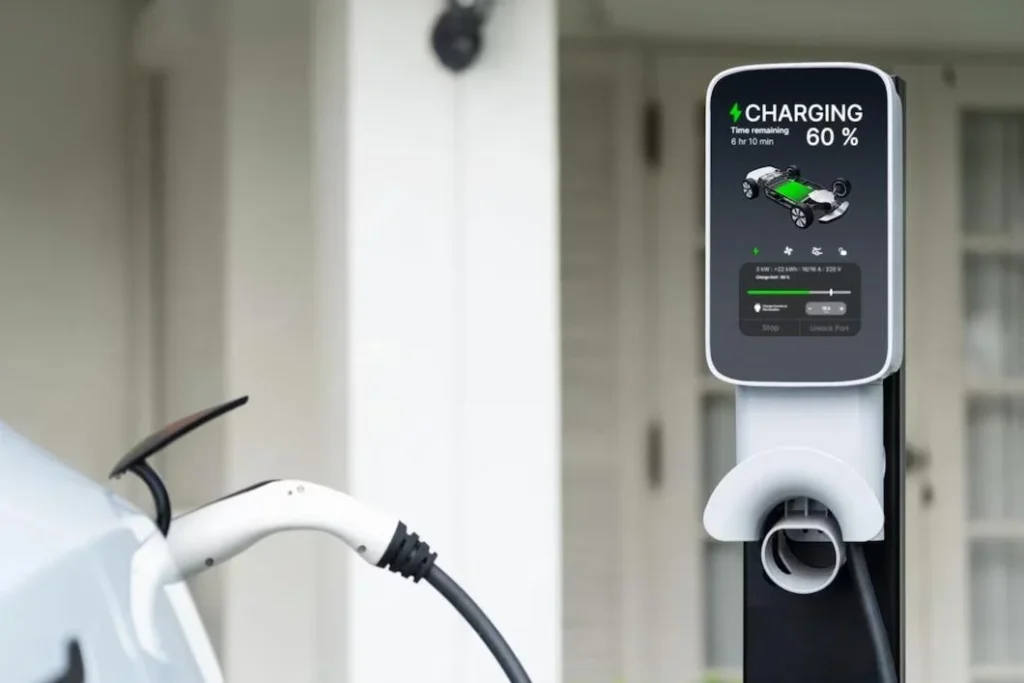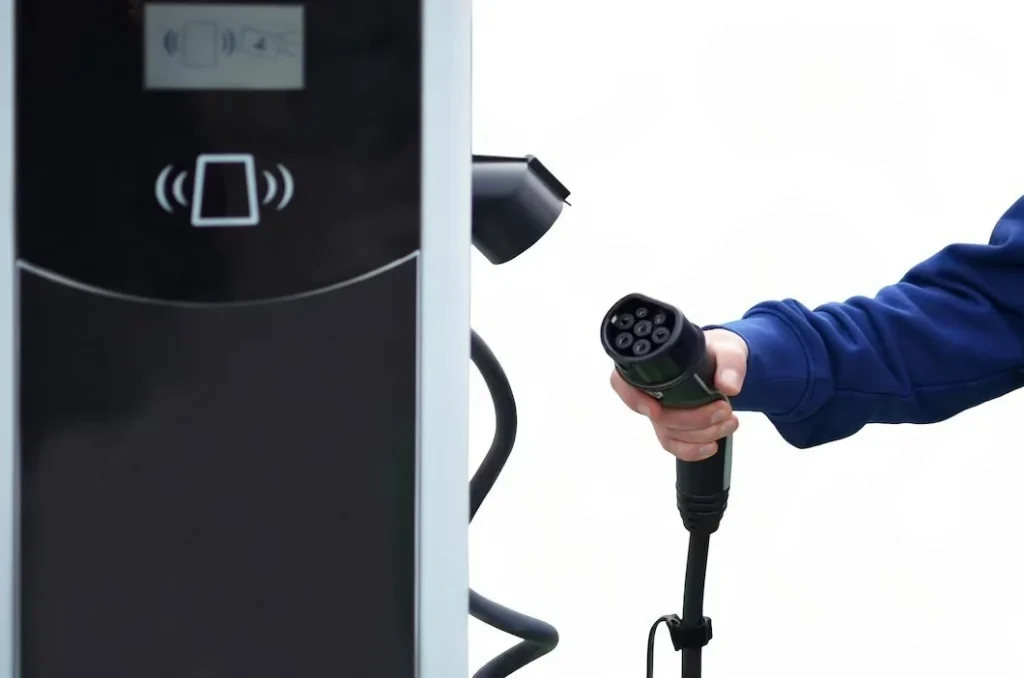With EVs becoming more and more prevalent, setting up an apt home charger has to be one of the priorities for the majority of drivers. A very important decision that the homeowner has to make is between different EV chargers, namely a 32 Amp or a 40 Amp EV charger. Understanding the difference can go into actually affecting your EV’s charging capacity, the installation costs, and how much convenience you find in the process.
In this article, we shall try to separate the really worth-it gains and their cost and decide on which charger is more deserving of your money, depending on the need in question. By the time you finish reading this article, you will have the requisite knowledge to pick a charger that fits your personal situation.
What is an EV Charger?
Before we move to dissect the 32 Amp vs 40 Amp EV charger debate, it would surely be better to understand what an EV charger actually is and how it works.
There are all kinds of EV chargers with varied types and power ratings. The most common types used in homes are Level 2 chargers (240V outlet is used here). These chargers deliver faster charging speeds as compared to the Level 1 chargers, which require just a normal outlet in your house, but are slower.
Level 1 Chargers: These plug into your typical 120V household outlet and can provide 2-5 miles of range for every hour of charging.
Level 2 Chargers: These use a 240V outlet and range from 10-60 miles of range per hour, depending on the amperage of the charger.
For homeowners, the 32 Amp vs 40 Amp EV Chargers in contention are both Level 2 chargers meant for daily home use.

32 Amp vs 40 Amp EV Chargers: What Is the Difference?
The difference and distinction between a 32 Amp vs a 40 Amp EV charger really lies in the charging speed and power output.
32 Amp Charger: This charger can deliver a maximum 7.7 kW of power (32 amps x 240 volts). This is usually enough for most electric vehicles to give a good overnight charge if needed. A 32 Amp charger provides approximately 25-30 miles of additional range for every hour of charging, depending on the efficiency of the vehicle.
40 Amp Charger: A little more powerful at 9.6 kW output (40 amps x 240 volts), it has faster charging capabilities than that provided by the 32 Amp charger. On a 40 Amp EV charger level, range increments could be around 30-35 miles per hour of charging, good for those needing to recharge an EV fast or those with larger battery capacities.
The 40 Amp charger will be sufficient for high-mileage drivers or EVs with large battery packs, such as the Tesla Model S or the Ford Mustang Mach-E, which require higher power to charge faster.
These first inquiries include: “How many amps are needed to charge an electric car?” In reality, it may depend on the size of the battery the car has, the efficiency with which it uses electricity, and the hours it is driven. Understanding the right amps for electric car chargers is essential, as the amperage directly affects charging speed, circuit capacity, and whether your home’s electrical panel can support your EV.
Standard EVs, such as the Nissan Leaf, Chevrolet Bolt, and the base model of the Tesla Model 3, charge perfectly fine with a 32 Amp charger. These vehicles can generally be charged to approximately 7.7 kW; therefore, using a 32 Amp charger is cost-effective and sufficient.
Bigger EVs: Those high-performance EVs or those with larger batteries, such as the Tesla Model S or Audi e-tron, would be better suited for a 40 Amp charger. Bigger battery packs that can accept higher-rate charging are usually charged by those vehicles that would otherwise suffer from excessive charging time.
Based on the key insight: on most accounts, the average 32 Amp charger will work for any EV user, but a 40 Amp charger is typically set aside for high-mileage users or EVs with bigger batteries.
Pros and Cons of 32 Amp vs 40 Amp Chargers
32 Amp EV Charger
Pros
- Less expensive to purchase: The price of a 32 Amp charger will almost certainly be lower than a 40 Amp model, anywhere from $400 to $700.
- Less costly installation: With their lower electrical demand, 32 Amp chargers generally entail less complicated installation methods and are therefore cheaper to install, ranging from $300 to $500.
- Good for charging most EVs: When a driver’s daily commute can be easily supported within an EV battery range, a 32 Amp charger offers a reliable and efficient option for charging.
Cons
- Longer charging times: Not much of an issue for many, however, those who require quicker turnaround times may find the 32 Amp chargers somewhat slow, especially if they do lots of long-distance drives every day or have the bigger end of EVs.
- Sizable battery packs only: It might just not be the speediest option for those EVs that carry bigger battery packs.
40 Amp EV Charger
Pros
- Charging fast: A 40 Amp charger can easily charge the car faster, giving 30-35 miles per hour of range. It is preferred by people who run higher mileage daily or have EVs with larger batteries.
- For the high-mileage type of people: If you want fast charging in between drives or you don’t want to wait overnight for a full charge, then a 40 Amp charger is your best option.
- Going forward, with improving technology in EV batteries and more high-capacity EVs entering the market, 40 Amp chargers will be in a good position to support all those charging needs.
Cons
- Greater upfront cost: The 40 Amp charger is more expensive to buy upfront; prices range from $600 to $1,000 and beyond, depending on brand and features.
- An installation with a 40 Amp charger is more expensive: Since the electrical demand is higher in this case, installation costs are somewhat higher and typically range from $500 to $1,000. You might also have to upgrade your electrical panel if it can’t bear the increased load.
Real Gains: Advantages of a 40 Amp EV Charger

While a 32 Amp charger is enough for many EV owners, a 40 Amp charger has its distinct advantages in speed and efficiency, which may be suited to particular driving needs:
- Pulling in Less Time: With a long daily commutation or on those bigger-gated battery packs, the 40 Amp charger can save you enormous amounts of time. The 32 Amp charger might take 10-12 hours to fully charge a Tesla Model S. With a 40 Amp charger, however, it would only take about 8-10 hours, thereby leaving you with more driving time during the day.
- Handling Larger Batteries: For electric vehicles such as the Tesla Model S, Model X, and Rivian R1T, the larger battery capacity allows them to accept more power, so the 40 Amp charger works best to ensure optimal charging efficiency for these vehicles.
- Fewer Charges Per Week: Faster charging means fewer charging sessions required per week. Say that with a 32 Amp charger, your car requires energy for 30 kWh a week; then, you probably need to charge every day using the 32 Amp charger. However, a 40 Amp charger may require charging every other day, saving you time in the long run.
Prices: 32 Amp vs 40 Amp EV Chargers
Assuming an EV charger, cost becomes a major consideration. Here’s a more in-depth comparison:
- Capital Investment: As mentioned, a 32 Amp charger will go for anything between $400 and $700, whereas a 40 Amp charger goes for around $600 to $1,000. Somehow, this price difference is due to the higher power output and slightly superior features of the 40 Amp charger.
- Installation Charges: Installing a 32 Amp charger is simpler and can cost anywhere between $300 and $500. On the contrary, installation for a 40 Amp charger is more complex and thereby more expensive, with prices generally ranging between $500 and $1,000, especially with such electrical demands. Some cases may even warrant an upgrade of your home’s panel to accommodate higher amperage ratings, which could raise the cost further.
- Electricity Costs: Operating Cost: Both chargers basically pull power from your home’s electrical system. However, the 40 Amp charger might witness insignificant rises in electricity cost because the 40 A charger charges faster.
Is This Worth It: Is a 32 Amp or 40 Amp EV Charger Right for You?
Choosing a 32 Amp vs a 40 Amp EV charger really depends on your requirements. You should opt for a 32 Amp charger if:
- You drive the EV with a small or medium battery (say, Nissan Leaf, Chevy Bolt)
- Your daily driving needs suffice with the standard charging speed
- You want to save on upfront costs and installation fees
You should opt for a 40 Amp charger if:
- You drive the EV with a big battery (say, Tesla Model S, Ford Mustang Mach-E)
- You drive high mileage daily and require fast charging speeds
- You plan to upgrade to a bigger or more powerful EV in the near future
Conclusion
The final decision between a 32 Amp vs 40 Amp EV charger can be influenced by charging requirements, vehicle type, and budget. Most EV owners should be fine with a 32 Amp charger, which delivers adequate power but comes with a smaller price tag.
For any EV owner with a big EV battery or high daily mileage, however, a 40 Amp charger will do better in fast charging and future-proofing. For those with multiple EVs or very large batteries, a 50 Amp charger can deliver maximum speed and efficiency, making it ideal for high-demand households while complementing the benefits of a 40 Amp setup.
When considering higher charging needs, it’s also helpful to understand the difference between 40 Amp and 50 Amp EV chargers, as the 50 Amp option provides faster top-ups and better accommodates multiple EVs at home. Ultimately, what is right for you will depend on how you use your car, the size of the battery inside the EV, and your long-term needs.


